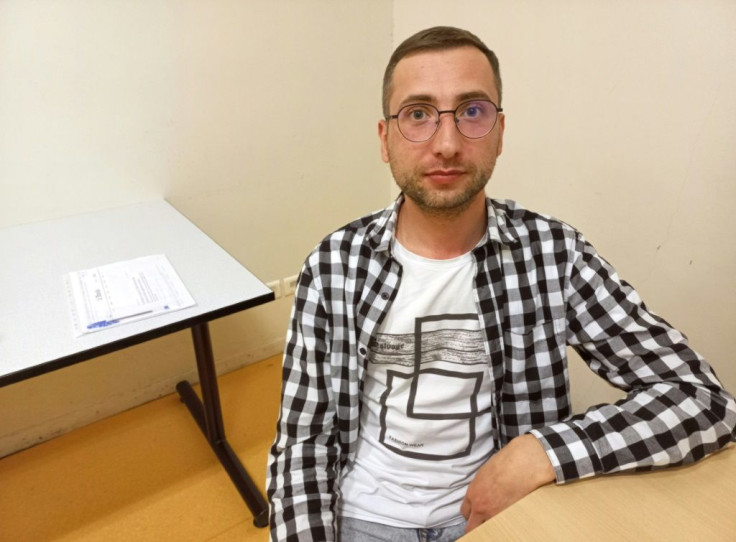Inmate Who Leaked Russia Prison Rape Video Seeks French Asylum
The former inmate behind a video leak showing alleged rape and torture inside a Russian prison said he could no longer keep the explosive revelations to himself, speaking to AFP from France where he is now seeking asylum.
Belarus-born whistleblower Sergei Savelyev "was authorised to enter French territory to file his asylum application within eight days", his lawyer, Aude Rimailho, told AFP on Monday evening.
Savelyev fled after his release from prison in February, fearing kidnapping or even death.
He smuggled shocking footage out of a jail in the central city of Saratov showing abuse in several jails, including one allegedly showing a male prisoner screaming while being raped with a broomstick.
Other clips showed prisoners urinating on other inmates, as well as graphic images of rape.
Some of the harrowing videos -- he smuggled more than 1,000 in all -- have been published by a Russian rights group, prompting an official probe and the sacking of several officials.
Torture and sexual violence inflicted on inmates have long been systemic in Russia's vast penitentiary system, prison monitors say, but the videos have cast new light on such abuses.
Speaking exclusively to AFP, Savelyev said he had no choice but to speak up.
"Psychologically, it's very difficult to keep things like this to yourself. What else can you do once you know?" the 31-year-old told AFP on Sunday at Charles de Gaulle airport.
Convicted for drug trafficking, Savelyev served 7.5 years in jail.
He got a job as an IT maintenance officer, granting him access to the prison's internal server and those of other jails, where he found several videos.
He saved them on USB sticks that he hid near the prison exit.
On the day of his release -- after a thorough search -- he grabbed the memory sticks on his way out, unseen by guards as a group of prisoners left.
"The idea had been bubbling away within me for ages," he told AFP of the plan.
But it was a nerve-wracking ordeal.
"To begin with, (officers) checked up on me, then the surveillance was gradually ramped down to the point it disappeared," said Savelyev, speaking in Russian.
Savelyev said he was stunned by the violence he witnessed in jail.
Often the abuse was doled out by fellow inmates, eager to please officers in the jail.
It is usually to try to force inmates to confess or snitch on other prisoners.
In some cases the abuse is filmed so the victim can then be blackmailed into cooperating with his handlers.

Or it is used to blackmail inmates -- if word of the assault becomes widely known, the victim slides down the rankings of the prison pecking order, reduced to a "petukh", or rooster, a derogatory term in Russia.
Savelyev said he suffered abuse at a prison in Krasnodar to force him to "cooperate" -- beaten "around once a week but not so hard as to leave too visible bruising".
He insists he never engaged in violence towards other inmates.
The guards found other ways of pressuring him too.
"My father travelled 1,000 kilometres (625 miles) to bring me some sausage. He tried (to get in) one day, then the next," he said.
"He slept for three nights in his car and they didn't let him in."
After the video was published online by Gulagu.net, a rights group dedicated to exposing abuses in Russian jails, Russia's Federal Prison Service (FSIN) announced a probe into the incident.
The head of the jail, where prisoners needing medical attention for tuberculosis are held, was sacked, along with three regional prison officials. And the top prison official for the Saratov region was also to be relieved of his post over "serious mistakes", authorities said.
Savelyev was released early for good behaviour, helped in part by his work as an IT expert.
He went back to Belarus, then to Turkey and to Tunis, before landing in Paris late on Friday where he applied for asylum.
He still has many other videos he collected in jail, but he refused to say what he plans to do with them.
He says he now fears reprisals from the FSIN and the Russian security service, the FSB.
After the videos were released he was in contact with security agents who offered him a shorter four-year sentence for "divulging a state secret" in exchange for his cooperation, instead of 10 to 20 years for espionage, he says.
He went along with the plan at first, as he plotted his exit.
"They weren't interested in knowing anything about human rights violations," he adds.
He escaped the country in a minibus over the Russia-Belarus border to Minsk -- an easier route to go undetected compared to flying.
Given the close cooperation between the security forces of the neighbouring states, he didn't want to stay long. He swiftly moved on to Istanbul, then Tunis, where he didn't need a visa to enter.
He then booked a return ticket back to Minsk but with a stop-off in Paris.
Now he's hoping he can stay, fearing for the worst if he goes back to Minsk.
His lawyer Rimailho says there are "serious fears" he could be subject to forced disappearance or even execution.
© Copyright AFP 2024. All rights reserved.





















